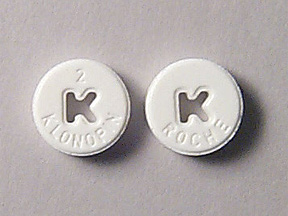Klonopin Addiction
In an article about her Klonopin addiction, Liz Spikol writes, “I never think of my asthma pill as a sexy proposition. I never look at my antipsychotic and think, ‘Ooh, what I could do with one extra pill…'” Klonopin, on the other hand, seems to tempt her, and she counts her pills carefully and wonders what might happen if she took an entire bottle at once. She thinks, “Wow. I could get so high with all these.” These might be thoughts that other women might relate to very well, and while they might not want to admit it, Klonopin addiction might be a factor for women who have thoughts like this.
What Klonopin Can Do
 Medications aren’t inherently good or bad, and there are many people who take Klonopin for very real conditions and the relief they experience due to the drug might not be available to them via any other method. However, Klonopin has also been associated with high rates of addiction and abuse, and it’s something women must be especially aware of, as they’re provided with Klonopin prescriptions on a somewhat regular basis.
Medications aren’t inherently good or bad, and there are many people who take Klonopin for very real conditions and the relief they experience due to the drug might not be available to them via any other method. However, Klonopin has also been associated with high rates of addiction and abuse, and it’s something women must be especially aware of, as they’re provided with Klonopin prescriptions on a somewhat regular basis.
Klonopin, also known by the generic name clonazepam, is a benzodiazepine medication that was created to help doctors in the fight against seizures. All benzodiazepines slow down electrical activity within the brain, allowing a hyper brain on the verge of collapse to slow down, relax and function normally. Klonopin is particularly helpful for those with seizure potential, as it tends to stay active within the body for a long period of time, meaning that people don’t need to remember to take the drug frequently. One little dose can keep working for a long period of time.
The soothing, calming effect of Klonopin is also helpful for people who have anxiety disorders. Their brains are also much too active, firing at a rate that’s too rapid, and the chemical action of Klonopin seems to help them to feel more relaxed, at ease and in control. For people who have anxiety disorders, this is a drug that can provide real help, and they may be provided with the drug for an extended period of time as a result.
Short-term prescriptions for Klonopin might be provided for people who are recovering from addictions to alcohol or illicit drugs. Some of these people might be at risk of a seizure as their bodies adjust to the lack of the drugs they were once addicted to, and others develop anxiety and depression as they learn to live a sober life. Klonopin can, for both of these groups of people, be of amazing help.
Tolerance, Dependence and Addiction
People who take Klonopin, even for a short period of time, can become tolerant to the drug’s effects. Their bodies might adjust their chemical response to the drug, and these people may find that they need to take larger and larger doses in order to feel the responses that once came easily. In time, dependence can develop, meaning that people don’t feel well without Klonopin. When they don’t have access to the drug, they can develop:
- Anxiety
- Irritability
- Tremor
- Gastrointestinal upset
- Aching muscles
- Insomnia
These symptoms might be frightening, and they do indicate that the person has a physical need for Klonopin at that time, but dependence like this isn’t the same as an addiction. In an article in the American Journal of Psychiatry, experts state that a physical dependence is a natural reaction that develops when a person takes a drug that impacts the nervous system. An addiction, on the other hand, “… refers to the loss of control over the intense urges to take the drug even at the expense of adverse consequences.” Not everyone who develops dependence is addicted. But people who are compulsively using Klonopin, and they keep on using the drug even when they know the drug is bad for them and the use should be stopped, are probably addicted. The compulsion separates the two states.
Special Considerations for Women
 In a study in JAMA, conducted in the early 1980s, researchers found that women were given prescriptions for benzodiazepines more often than men were. It’s a fact that other studies have also uncovered, but it’s unclear why more women than men are given access to this drug. Perhaps women develop anxiety at a greater pace when compared to men, or perhaps women are more willing to discuss their mental health issues with their doctors, when compared to men, and perhaps they take home prescriptions more often as a result of these discussions. For example, a study in the journal Postgraduate Medicine found that middle-aged women were given benzodiazepines remarkably often, but they also had marital problems and life crises that upset them, and the medications helped. In this study, the researchers found no evidence that medications were given indiscriminately.
In a study in JAMA, conducted in the early 1980s, researchers found that women were given prescriptions for benzodiazepines more often than men were. It’s a fact that other studies have also uncovered, but it’s unclear why more women than men are given access to this drug. Perhaps women develop anxiety at a greater pace when compared to men, or perhaps women are more willing to discuss their mental health issues with their doctors, when compared to men, and perhaps they take home prescriptions more often as a result of these discussions. For example, a study in the journal Postgraduate Medicine found that middle-aged women were given benzodiazepines remarkably often, but they also had marital problems and life crises that upset them, and the medications helped. In this study, the researchers found no evidence that medications were given indiscriminately.
Women shouldn’t be afraid to take Klonopin if they need it for a specific mental or physical ailment, as there is no evidence that women develop addictions to this medication at a faster rate when compared to men. However, since women are provided this medication more often than men, they should know how the drug works, and what an addiction to Klonopin might look like, so they can know how to stay safe.
Spotting the Signs
People who use benzodiazepines like Klonopin properly, per their doctors’ instructions, tend to feel better as a result of the medications they take. Those who abuse Klonopin, on the other hand, tend to feel worse. The drug can hijack the brain’s pleasure centers, and as a result, people might feel sad or just plain ill when they don’t have active drugs in their system. They may find that they only feel happy while taking the drug at a massive dose. In time, these people may find that they want to take very large doses of Klonopin when they have a bad day or some kind of disappointment. This is a big red flag, as people who take Klonopin in larger-than-recommended doses because they’re unhappy are abusing the drug. They’ve moved past therapy and into addiction.
Other signs of Klonopin addiction include:
- Taking doses too close together
- Crushing pills in order to snort them or inject them
- Shopping for doctors willing to write new prescriptions
- Binging on prescriptions when they’re filled; taking all of the tablets at once
- Feeling angry or upset when confronted about the Klonopin use
According to an article in the journal Addiction, researchers can use a specific “severity of dependence scale” in order to screen for addiction, asking people a series of questions about their use of the drug and how they feel about the drug when they take it. People who aren’t quite sure if they are addicted could easily make an appointment with a doctor and ask to be screened for addiction. But it’s also possible that people who are addicted will know, deep down, that their use of Klonopin isn’t quite healthy. If they do an honest self-assessment, the addiction might be all too clear.
Klonopin addictions aren’t limited to people who have started taking the drug under the behest of a doctor. There are many people who develop addictions to this drug because they’ve taken leftover pills they’ve found in medicine cabinets of family members or friends. Others have developed addictions to Klonopin pills they’ve bought from street dealers. Still others develop addictions when they buy Klonopin from online vendors. These people may have a more difficult time assessing their addiction, as they have no prescription and therefore don’t know if they’re taking the drug in an improper dosing schedule, but people like this are definitely abusing the drug. From an addiction standpoint, people who take this drug recreationally will likely need help in order to heal, so they can learn why they’re tempted to take drugs when no doctor tells them that it’s safe to do so.
Getting Better
 Having an addiction to Klonopin can be isolating, and people who have addictions like this may come to believe that they’ll simply never get better and they’ll be forced to take this drug for the rest of their lives. In reality, while Klonopin addictions can be tricky to deal with, they can be overcome. The key is to get into a proper treatment program. People who attempt to stop taking these drugs on their own can face a frightening array of symptoms, and they might even develop seizures. In a treatment program, they’ll have access to medications that can soothe physical distress and therapies that can make a sober life easier to achieve. With this kind of help, recovery really is possible.
Having an addiction to Klonopin can be isolating, and people who have addictions like this may come to believe that they’ll simply never get better and they’ll be forced to take this drug for the rest of their lives. In reality, while Klonopin addictions can be tricky to deal with, they can be overcome. The key is to get into a proper treatment program. People who attempt to stop taking these drugs on their own can face a frightening array of symptoms, and they might even develop seizures. In a treatment program, they’ll have access to medications that can soothe physical distress and therapies that can make a sober life easier to achieve. With this kind of help, recovery really is possible.
In one study of the issue, published in the journal Psychology and Psychotherapy, 54 percent of those who went through a benzodiazepine addiction treatment program were still sober from the drugs five years later. Interestingly, more women than men were able to stay sober, although researchers weren’t sure why. It’s possible that others recovered later, with subsequent treatment, although researchers didn’t track these success stories. These studies just prove that Klonopin addictions aren’t permanent, and that people really can improve.
At The Orchid, we specialize in helping women who have addictions, mental illnesses or both. All of our clients are women, as are all of our employees. We provide an environment that is caring, supportive and healing, and we’d like to help you kick Klonopin addiction for good. Please call us to find out more and to schedule an intake appointment.
